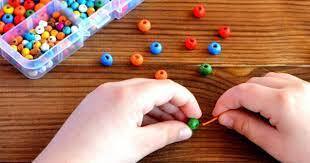Improving fine motor skills in children with intellectual disabilities

Fine motor skills are movements that involve small muscles, such as the wrist or fingers. One example of an activity that requires fine motor skills is holding small objects, such as a spoon, cutting paper, and folding paper. A baby's first fine motor movement is clenching his fists. Generally children's fine motor skills need to be stimulated, in order to develop optimally.

Children with intellectual disabilities tend to have difficulty controlling their behavior. If you have a child with an intellectual disability, your child may have difficulty understanding your instructions. One way that can be done to stimulate the fine motor skills of children with intellectual disabilities, is by playing. The following are examples of activities that can be done to improve fine motor skills in children.
1. Play origami
Ask children to cut and/or fold origami, form an object, or let children create their own. By playing origami, children practice the ability to move their fingers, wrists, and hands. Not only that, while practicing fine motor skills, children are also trained in eye coordination, creativity, and focus.

2. Finger Painting
Finger painting, as the name suggests, is an activity of painting, but using fingers, without other tools such as brushes. Playing finger painting can train the strength of the palms, as well as the stability of the hands and fingers. In addition, children can also be trained in their creativity, and trained not to be afraid of getting dirty.

3. Fan making
Ask the children to make a fan by folding paper. Making a fan, just like a child playing origami, trains the strength of the child's fingers to fold, with two alternating directions.
4. Bracelet making
This activity requires thread or string, and beads. To make bracelets, children must use their right - left hand coordination, practice finger strength to grip small objects, and eye coordination when inserting beads. Children are also trained in their creativity in making bracelets, and moreover, these bracelets can be used by them, thereby increasing their sense of pride.

If the above activities are too difficult to do because of the unavailability of tools, actually, children can practice their fine motor skills by doing daily activities, such as the one below.
1. Pouring water from the bottle and closing the bottle
Parents often forbid their children to do activities like this, for fear of the house getting wet or dirty. However, this kind of activity is good for training the child's hand strength in holding the bottle so that the bottle remains stable on the glass. In addition, children's patience and eye coordination are also trained. If it is continued by closing the bottle, finger strength and eye coordination can be trained again
2. Attaching buttons
When attaching buttons, of course, children need skills to hold small objects (buttons and holes), hand and finger coordination, and eye coordination. Children also learn to focus and be patient when attaching buttons.
3. Unlock keys
When children open locks, children learn a lot to hold small objects, keys and and the locks. In addition, children's eye, hand, and finger coordination are trained in this activity.
Many daily activities can train fine motor skills. Involving children in simple activities such as pouring water, opening doors, etc. can train children's fine motor skills, without having to give complex instructions.
Theofania Natasya Rukma S.Psi
BluBridge Center
References :
Kurniawati, A., Hastuti, W. D., & Praherdhiono, H. (2018). The Effect of Finger Painting towards Fine Motor Skill of Intellectual Disability. Jurnal Penelitian dan Pengembangan Pendidikan Luar Biasa, 5(1), 47-51.
Lersilp, S., Putthinoi, S., & Panyo, K. (2016). Fine motor activities program to promote fine motor skills in a case study of down’s syndrome. Global journal of health science, 8(12), 60-67.
Pradipta, R. F., & Dewantoro, D. A. (2019). Origami and fine motoric ability of intellectual disabiliy students. International Journal of Innovation, 5(5), 531-545.
Fine motor skills, fine motor, improving fine motor skill, intellectual disability, simple activity
Special Needs / Berkebutuhan Khusus / Fine Motoric / Motorik Halus / Education / Pendidikan / Improving fine motor skills in children with intellectual disabilities
Comments













